 Photo courtesy of the Swedish Institute of International Affairs
Photo courtesy of the Swedish Institute of International Affairs
ASP CEO BGen. Cheney Speaks at Swedish Seminar on Climate Security
On June 5, ASP CEO Brigadier General Stephen Cheney spoke at a seminar hosted by the Swedish Institute of International Affairs titled “The Climate Change and Security Nexus.” Along with fellow panelists Representative Linnea Engström of the European Parliament, Professor Robert Egnell of the Swedish Defense University, and moderator Dr. Gunilla Reischl of the Swedish Institute of International Affairs, Cheney discussed the connections between climate change and security concerns on a global scale. The seminar was recorded, and it is now available in podcast form on the Swedish Institute of International Affairs’ website.
Dr. Reischl began the conversation by framing climate security as a risk of the present, rather than a concern for future generations, and asked General Cheney to explain how climate change and security interact. Cheney began by describing ASP’s mission: to “take politics out of the issue” of climate change by presenting it as a security threat.
He divided climate threats into two categories: tactical and strategic. Tactical climate threats directly impact military operations, such as when extreme weather events and sea level rise impact bases, while strategic climate threats are more long-term, presenting challenges for militaries worldwide over the next 20+ years. Cheney gave two examples of strategic threats: Syria, where a 2006-2011 drought contributed to the conflict that continues there today, and Bangladesh, where a 1.5-foot sea level rise would submerge over half of the country’s densely-populated landmass.
As a contrast to Gen. Cheney’s U.S. military perspective, Engström provided a more policy-focused, European view. Engström discussed the first E.U. report on climate justice, published this year, which highlights that “climate change is unjust- it hits the poor and the vulnerable the hardest.”
Professor Egnell added nuance to the discussion by criticizing the concept of climate security itself. He asked whether framing climate change as a national security issue might lead to two adverse outcomes: securitization, that is the prioritization of the military over other tools in crafting responses to climate change, and nationalism, causing countries to close borders and limit their concerns to only their own citizens’ interests. “No nation will be able to deal with these challenges on its own,” Egnell stated, concluding that climate change should be framed as a global or human security threat, rather than a national one.
Gen. Cheney responded to Egnell’s statements by assuring him that ASP is not trying to militarize the response to climate change. Rather, it uses the military’s position as America’s “most respected institution” to better communicate the threats of climate change to those who might otherwise not participate in the conversation.
Cheney moved on to describe the U.S. military’s actions in terms of adapting to climate change and attempting to mitigate its future consequences. Two examples of such actions were the inclusion of catastrophic weather-response items in U.S. Pacific Command’s budget, and plans to cut down on fossil fuel use by the Department of Defense’s “tens of thousands” of aircrafts. Egnell agreed with Cheney that militaries are especially useful for dealing with catastrophes, citing the case of a 2005 tsunami in the Indian ocean, in which the Indian army was instrumental in providing humanitarian aid to Sri Lanka, the Maldives, and Indonesia.
Engström echoed Egnell’s concerns about states turning inward, closing their borders in attempts to avoid the effects of climate change rather than confronting its root causes. All of the panelists agreed that climate change has caused mass migration, which will only increase in scale and speed as the Sahel region of Africa undergoes rapid desertification. Engström connected the issue to the UN Global Compact on Migration, currently being written, and mentioned that several European delegates are “really trying” to get language on climate refugees into the document.
The discussion then turned to leadership and political will to act on climate security issues, led by Cheney’s admission that the U.S. “basically abandoned its leadership position… on climate change.” Egnell and Engström agreed that political will behind climate change action is hard to create. Egnell pointed out that it is sometimes difficult to see climate change as the cause of more immediate problems like mass migration and sea level rise, and encouraged politicians to focus on real solutions.
General Cheney concluded the seminar by acknowledging Representative Engström’s important work, stating that she had “taught him a new definition of adaptation” that includes preparing infrastructure for mass migration, as well as more concrete projects like sea-walls and bases built on higher ground.





